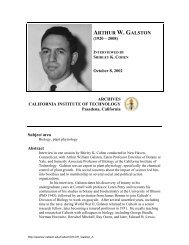Interview with David Baltimore - Caltech Oral Histories
Interview with David Baltimore - Caltech Oral Histories
Interview with David Baltimore - Caltech Oral Histories
You also want an ePaper? Increase the reach of your titles
YUMPU automatically turns print PDFs into web optimized ePapers that Google loves.
<strong>Baltimore</strong>-10<br />
college at that point; he was four years older than I was. He’s dead now, of course; he died quite<br />
young [1994]. He was sort of the guru of the high school program. If you had a question, you<br />
went to Howard, and he always knew the answer. Howard knew everything. I mean, he was<br />
famous at Swarthmore—he went to Swarthmore—for knowing everything.<br />
LIPPINCOTT: How many other high school students were there that summer <strong>with</strong> you<br />
BALTIMORE: It’s a program that runs every summer. There are twenty-five or so students.<br />
LIPPINCOTT: And it was a couple of months that you were there<br />
BALTIMORE: Yes, six or eight weeks.<br />
LIPPINCOTT: What kind of work did you do there<br />
BALTIMORE: It was a structured program. There were lectures, from the staff and from visiting<br />
scientists, every day or two. And then there were three research projects that you did, <strong>with</strong> three<br />
of the staff scientists or summer visitors. They were little projects; they dealt <strong>with</strong> some aspect<br />
of genetics—coat-color mutants. You couldn’t really do much genetics, because a mouse takes<br />
three months to breed, so you can’t get many generations in a summer.<br />
LIPPINCOTT: But they taught you techniques, I guess.<br />
BALTIMORE: They taught us techniques—the techniques were simple. For instance, I measured<br />
lengths of bones from skeletons of mice, because the man I was working <strong>with</strong> was interested in<br />
seeing whether there were genetic differences of some sort—I don’t remember exactly what he<br />
cared about. I used calipers and measured bone lengths and looked up some statistics on it and<br />
whatever. And I did something <strong>with</strong> the great Tibby Russell, who was one of the founders of the<br />
genetics of the blood system.<br />
LIPPINCOTT: That’s Elizabeth Russell

















